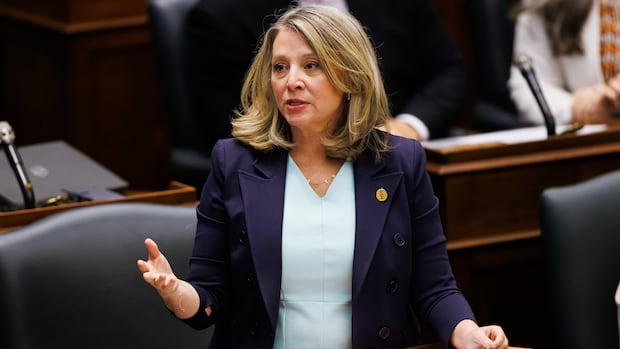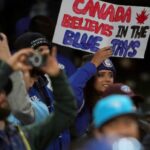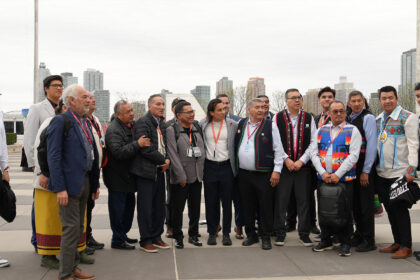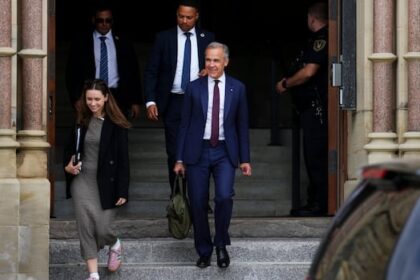TorontoWith tickets to the Blue Jays World Series games selling for thousands of dollars over original cost, the Ontario NDP is calling on the government to pass legislation that would ban marking up the price of resale tickets.Announcement in response to high cost of Jays World Series tickets, Liberal Party makes similar announcementOskar McCarson · CBC News · Posted: Oct 23, 2025 1:45 PM EDT | Last Updated: October 23Listen to this articleEstimated 4 minutesOntario NDP wants to ban resale markupsThe Ontario NDP says it will put forward a motion to ban the resale of tickets above their initial value. As CBC’s Lorenda Reddekopp explains, this comes as tickets for the Toronto Blue Jays soar for the World Series games. With tickets to the Blue Jays World Series games selling for thousands of dollars over original cost, the Ontario NDP is calling on the government to pass legislation that would ban marking up the price of resale tickets.The motion put forward by the NDP looks to update the Ticket Sales Act to combat fraud, and predatory pricing by banning the sale of tickets above face value, but did not mention how this policy would be enforced.“Here’s the choice we’re putting towards Conservatives. You can either vote with us to finally end ticket gouging once and for all, or keep siding with the resellers and leave fans on the sidelines,” said Leader Marit Stiles at a news conference Wednesday.WATCH | Fans react to Jays ticket costs:Blue Jays fans react to World Series ticket and merch costsBaseball fans are set to bring their energy, and their wallets, to Toronto to see the Blue Jays play the first two games of the World Series. CBC’s Marianne Dimain and Meagan Fitzpatrick report on how much tickets and merch are going for.The push comes amid the excitement surrounding the Jays making it to the World Series for the first time in over 30 years. Tickets to their first home game against the Los Angeles Dodgers initially cost around $500 and are currently reselling for between $1,400 and $4,200.Ontario has had similar legislation in the past, where resale prices were limited at 50 per cent of the original ticket value, but it was scrapped by Doug Ford’s government in 2019.At the time, the Conservatives called the legislation “unenforceable.” Still, on Wednesday, Ford said his government is currently looking at ways to limit ticket resale prices as a result of the World Series controversy.“When you have one player in the market that controls the tickets, that’s not right for the people,” said Ford at Queen’s Park. Doug Ford said his government was looking at ways to limit the price hikes consumers are facing, similar to legislation his office cut in 2019. (Pelin Sidki/CBC)The Liberal Party also said it would be putting forward legislation to reinstate the original 50 per cent cap, in a statement released Wednesday.Policy change possible, but could be difficultSome experts say that there is precedent for this type of law, but implementation may be challenging.“It is enforceable, translating public policy to business design is totally possible,” said Vass Bednar, managing director of the Canadian Shield Institute, a policy institute focused on Canada’s economy.“We can push back against the idea that this is the way things need, or have, to be and that we have to accept it.”WATCH | Jays tickets cost spark calls for regulation:Blue Jays World Series ticket resale prices ignite calls for regulationToronto Blue Jays fans were queued up in the thousands to land tickets to the World Series games at Roger’s Centre, but many couldn’t get access and were frustrated to see resale tickets priced at thousands of dollars to sit — or stand — in the cheap seats.Stephen Selznick, a partner with Cassels Brock & Blackwell LLP in Toronto, said there are rules around ticket pricing in some jurisdictions in Canada, but they tend to be limited to barring bots or requiring platforms to prove that resold tickets are authentic. Selznick said the problem isn’t easy to solve because ticket prices are a limited commodity — there are only so many seats in a stadium, and the demand usually outpaces supply.“When you have only, you know, 50,000 tickets to sell, you’re really at the mercy of the vendor when there’s a demand for more than that,” Selznick said. A similar law in Quebec prevents tickets from being resold for over their initial purchase price unless authorized by the show or event producer, though the system isn’t free of loopholes.According to Bednar, policy that caps resale prices could help solve that problem. Legislation that limits dynamic pricing (prices that fluctuate based on market conditions, such as the time of day), or that requires sites to disclose the face-value price of a ticket during the resale process, are options that other countries have taken, she said.Ticketmaster did not respond to CBC News request for comment, but in a statement to The Canadian Press said it appreciates the concern about high prices but that it is not setting those prices, “nor is any one person or entity.””The resale prices are set by numerous small sellers,” Ticketmaster said in the emailed statement.ABOUT THE AUTHOROskar McCarson is a Toronto-based journalist currently working as a web writer at CBC Toronto.With files from Abby Hughes and The Canadian Press
Tuesday, 3 Feb 2026
Canada – The Illusion
Search
Have an existing account?
Sign In
© 2022 Foxiz News Network. Ruby Design Company. All Rights Reserved.
You May also Like
- More News:
- history
- Standing Bear Network
- John Gonzalez
- ᐊᔭᐦᑊ ayahp — It happened
- Creation
- Beneath the Water
- Olympic gold medal
- Jim Thorpe
- type O blood
- the bringer of life
- Raven
- Wás’agi
- NoiseCat
- 'Sugarcane'
- The rivers still sing
- ᑲᓂᐸᐏᐟ ᒪᐢᑿ
- ᐅᑳᐤ okâw — We remember
- ᐊᓂᓈᐯᐃᐧᐣ aninâpêwin — Truth
- This is what it means to be human.
- Nokoma











